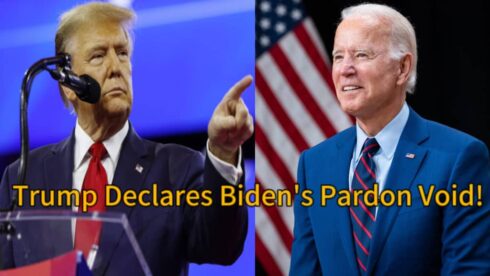Donald Trump has unleashed a political and legal maelstrom by declaring that President Joe Biden’s recent pardons are “void, vacant, and of no further force or effect.” According to Donald Trump, the clemency orders were issued without Biden’s direct knowledge and were instead signed using an autopen—a machine that replicates a person’s signature. The former president contends that because Biden did not personally review or approve the documents, the pardons lack constitutional legitimacy.
This claim challenges the very foundation of presidential pardon authority, sparking heated debates over executive responsibility and procedural integrity. While previous administrations have used autopen signatures for official documents, Trump argues that this case is different, as it allegedly involves an uninformed president and potential misconduct by those who facilitated the process.
Legal Experts Divided: Can a Pardon Be Declared ‘Void’?
Donald Trump’s assertion that Biden’s pardons are legally void is unprecedented, prompting a fierce debate among constitutional scholars. The U.S. Constitution grants the president absolute pardon power, with no formal requirement that the president personally sign each order. However, Trump’s argument hinges on the idea that a pardon, to be valid, must be a direct act of presidential discretion, not a bureaucratic formality.
Legal analysts are divided on whether this argument holds weight. Some argue that as long as Biden authorized the use of the autopen, the pardons remain legally binding. Others suggest that if Biden was completely unaware of the specifics, it could raise concerns about executive negligence or procedural misconduct. Regardless of the legal merits, Trump’s claims have injected fresh uncertainty into the legal standing of Biden’s clemency decisions.
Political Fallout: Donald Trump’s Strategy to Undermine Biden’s Authority
Donald Trump’s move is more than just a legal challenge—it is a calculated political maneuver designed to paint Biden as a weak and detached leader. By claiming that the president did not personally review the pardons, Trump is reinforcing a narrative that Biden is not fully in control of his administration. This plays into broader Republican arguments that Biden is too disengaged, too reliant on unelected advisors, and possibly unfit for office.
This narrative is particularly potent as the 2024 election cycle heats up. Donald Trump’s allegations serve to rally his base, keeping Biden’s leadership under relentless scrutiny. If Trump can successfully convince voters that Biden is either incompetent or being manipulated by unseen forces, it could significantly weaken the president’s re-election campaign.
Congressional Republicans Call for Investigation
Donald Trump’s statement has sent shockwaves through Republican circles, with many lawmakers demanding an immediate investigation. House Judiciary Committee Chair Jim Jordan has signaled plans to scrutinize the legality of Biden’s pardons, while Senate Republicans are weighing their options. The potential for congressional hearings could keep the controversy in the headlines for months, creating additional political headaches for the White House.
On the more extreme end, some Trump allies are pushing for legal action against those involved in the pardon process. They argue that if Biden was uninformed, the individuals who facilitated the pardons may have acted fraudulently or even criminally. This could lead to subpoenas, depositions, and an escalating legal battle that further polarizes Washington.
White House Response: Dismissing Donald Trump’s Claims as ‘Absurd’
The Biden administration has dismissed Trump’s accusations as a baseless distraction. White House Press Secretary Karine Jean-Pierre called Trump’s claims “utter nonsense,” stating that all pardons were legally vetted and executed according to standard procedures. She emphasized that autopen use is not illegal and has been employed by multiple past presidents, including George W. Bush and Barack Obama.
Despite this pushback, the controversy has put the White House on the defensive. Questions about Biden’s direct involvement in major decisions have dogged his presidency, and this latest accusation only adds fuel to the fire. If the administration cannot convincingly prove that Biden was fully engaged in the pardoning process, doubts about his leadership could deepen.
Implications for 2024: Will This Hurt or Help Biden?
The fallout from this controversy could have serious implications for the 2024 presidential race. For Trump, this is a golden opportunity to hammer home his argument that Biden is not actually governing. By framing the pardon issue as another example of Biden’s detachment, Trump is strengthening his appeal to voters who already doubt Biden’s ability to serve a second term.
For Biden, the key challenge will be proving that he remains a hands-on leader. If his administration can swiftly disprove Trump’s claims and demonstrate that the pardons were properly issued, the controversy may fade. However, if questions linger, it could add to the broader narrative that Biden is increasingly disconnected from the daily functions of his own presidency. In a tight election race, such perceptions could be politically fatal.














